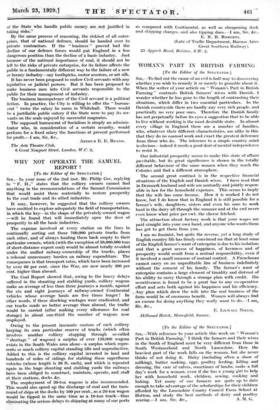WOMAN'S PART IN BRITISH FARMING [To The Editor of the
SPECTATOR.] SIR,—To find out the cause of an evil is half-way to discovering whether you wish to remedy it or merely to grumble about it. When the writer of your article on " Woman's Part in British Farming " contrasts British farmers' wives with Danish, I wonder whether he has gone to the length of contrasting their situations, which differ in two essential particulars. In the Danish countryside there are hardly any very rich people, and practically no very poor ones. Therefore the Danish family has not perpetually before its eyes a 'suggestion that to be able to live without working is the most desirable state. In almost every village in England there are a number of families, who, whatever their different characteristics, are alike in this that they do no manual work and exact the greatest deference from those who do. The inference to a simple country mind is obvious—indeed it needs a good deal of mental independence to resist it.
Our industrial prosperity seems to make this state of affairs inevitable, but its great significance is shown in the totally different behaviour of the same women when they reach the Colonies and find a different atmosphere.
The second great contrast is in the respective financial situations of the English and Danish wives. I have read that in Denmark husband and wife are mutually and jointly respon- sible in law for the household expenses. This seems to imply that the wife has some income. How it is worked I do not know, but I do know that in England it is still possible for a fanner's wife, daughters, sisters and even his sons to work hard in the dairy all through the summer and at the end never even know what price per cwt. the cheese fetched.
The attraction about factory work is that your wages are paid straight into your own hand, and anyone who wants them has got to get them from you.
I am no feminist, but quite the reverse, yet a long study of English country life has firmly convinced me that at least some of the English' farmer's want of enterprise is due to his isolation. and that a great access of happiness, of keenness and of prosperity would result from a mutual responsibility, even if it involved a small measure of mutual control. A Frenchman cannot carry on an unprofitable line of business indefinitely without the consent of his family. The farmer's want of enterprise contains a large element of timidity and distrust of his ability to carry through a strange plan with credit. His secretiveness is found to be a great bar to any co-operative effort and acts both against his happiness and his efficiency.
, Any plan which drew the wife into the real business of the farm would be of enormous benefit. Women will always find an excuse for doing anything they really want to do.—I am, Sir, &c., Millwood hatch, Maresfield, Sussex.
E. LII.WALL NIELD,
















































 Previous page
Previous page